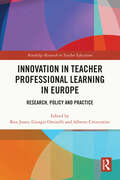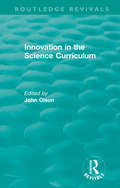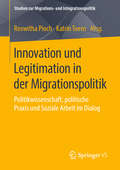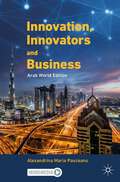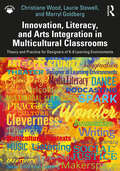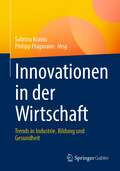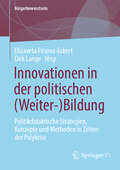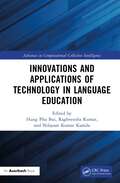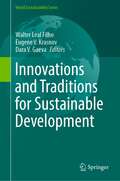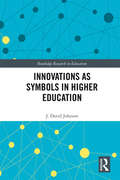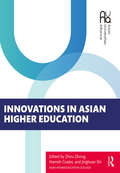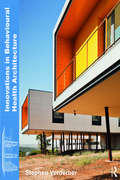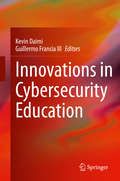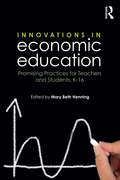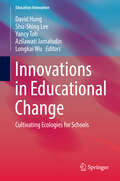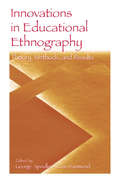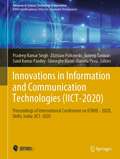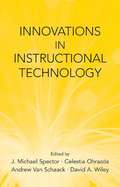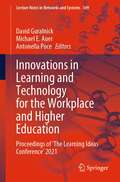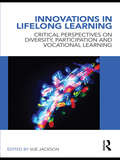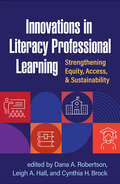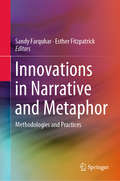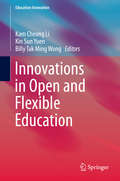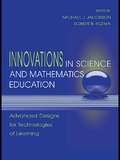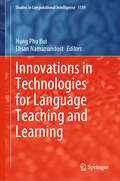- Table View
- List View
Innovation in Teacher Professional Learning in Europe: Research, Policy and Practice (Routledge Research in Teacher Education)
by Ken Jones Giorgio Ostinelli Alberto CrescentiniThis book presents critical perspectives on teacher professional learning and professional development as interpreted in 14 countries across Europe. Bringing together experts from across Europe, the book fulfils a need for a better understanding of the changing nature of teacher professional learning in national policy contexts and of the cultural differences existing between various systems. It discusses the new thinking that has emerged in the field of teacher education alongside new models that reflect the changing patterns and policies relating to the ways educational professionals maintain and enhance professional practice. The book highlights that new models of teacher leadership and practitioner inquiry have a strong focus on pedagogy and social justice. It also examines briefly the challenges brought about by the Covid pandemic and the ways in which new approaches to professional learning, specifically the use of new technologies, have begun to transform practice in some countries in Europe. The book gives insights into the ways in which professional learning policy is interpreted and applied in practice. It will be highly relevant for researchers and post-graduate students in the fields of teacher professional learning and development, school leadership, comparative education and educational policy and planning.
Innovation in the Science Curriculum (Routledge Revivals)
by John OlsonOf all the subjects in the school curriculum, science has been a most common target of the reformer’s zeal. As a consequence, school science has featured frequently in studies of change in evaluation exercises and has also attracted the interest of social scientists. There have been others who have studied the effects of innovation in this field not as evaluators, nor as scientists, but as students of curricular problems. Such work is represented in this book, originally published in 1982. It is particularly concerned with the way in which teachers use innovation and how this can assist policy making in the curriculum field. By focusing on the science curriculum the contributors examine in detail the way in which teachers cope with daily problems and with the demands that new ideas make on the systems to which they are accustomed. The relationship between the school and the community is also dealt with in these case studies, all of which have implications for policy and research in the curriculum field.
Innovation und Legitimation in der Migrationspolitik: Politikwissenschaft, politische Praxis und Soziale Arbeit im Dialog (Studien zur Migrations- und Integrationspolitik)
by Roswitha Pioch Katrin ToensWie kann die Politik Innovationen vorantreiben und zugleich Legitimation und demokratische Unterstützungsbereitschaft in der Bevölkerung erzeugen? Der Sammelband zeigt im Feld der Migrations- und Flüchtlingspolitik, wie im Regierungshandeln Innovation und Legitimation auf Bundesebene, in der Europäischen Union, in den Bundesländern und Kommunen zusammenhängen. Dazu dient der internationale Vergleich mit Kanada und anderen Einwanderungsländern.
Innovation, Innovators and Business: Arab World Edition
by Alexandrina Maria PauceanuThis textbook approaches innovation and innovators as two elements of an equation with business application. It discusses creativity, methods to develop creativity, design thinking, the lean startup and minimum viable product (MVP), personal development for entrepreneurs, charisma, franchising and cases from the UAE. It is designed to be a practical and up-to-date resource for an innovation and entrepreneurship course. It contains practical information about the innovation frameworks and their applicability, explanation of creativity and creative mindset, methods of innovation, design thinking in practice, lean startup methodology, charisma, setting up a business, go-to-market strategies, growth and change as well as franchise management. It comes with worksheets to help the reader in practicing. The book solves the need of having innovation resources in one place, well explained and exemplified for students, aspirant and existing entrepreneurs as well as innovation enthusiasts.
Innovation, Literacy, and Arts Integration in Multicultural Classrooms: Theory and Practice for Designers of K-8 Learning Environments
by Merryl Goldberg Christiane Wood Laurie StowellThis textbook offers a foundation for how literacy and arts integration interconnect to advance innovation, accessibility, and equitable classroom learning contexts for K-8 students. Balancing research-backed theory and classroom practice, this book helps readers understand the multiple perspectives, frameworks, and models necessary in the design of learning environments for diverse learners, including sociocultural theories of literacy, new and digital literacies, multiliteracies, culturally responsive pedagogy, critical pedagogy, and art. Written by an author team with decades of experience in teaching literacy, writing, and arts integration across a variety of learning environments, each chapter includes a basis of conceptual framing and research backed by functional case studies and practical classroom practices, as well as discussion questions. Written as a text for foundational literacy, arts integration, and education courses, Innovation, Literacy, and Arts Integration in Multicultural Classrooms offers an engaging, practical resource for both pre-service and in-service elementary and middle grade teachers and teacher educators.
Innovationen in der Wirtschaft: Trends in Industrie, Bildung und Gesundheit
by Philipp Plugmann Sabrina KraussDer globale Wettbewerb zwingt Unternehmen innovative Produkte und Dienstleistungen in immer kürzeren Innovationszyklen zu liefern. Um diese Performance leisten zu können müssen Zukunftstrends und Szenarien zahlreicher Branchen antizipiert und frühzeitig in Projekte und Zielsetzungen integriert werden, dabei können Experimente auch eine Rolle spielen. In diesem Buch stellen verschiedene Autoren aus Wissenschaft und Praxis unterschiedliche Entwicklungen, Zukunftstrends und Szenarien aus verschiedenen Bereichen der Industrien, dem Hochschuldbildungssektor und dem Gesundheitswesen dar. Leserinnen und Leser aus der Praxis erhalten Denkanstöße und Handlungsempfehlungen für Aktivitäten, im Rahmen der Gestaltung von Innovationskonzepten für die Zukunft, in ihrem Unternehmen oder Arbeitsfeld umsetzen können.
Innovationen in der politischen: Politikdidaktische Strategien, Konzepte und Methoden in Zeiten der Polykrise (Bürgerbewusstsein)
by Nele VerwiebeDie Gesellschaft befindet sich derzeit in einem Zustand, der von zahlreichen und akuten Krisen geprägt ist. Der Band erörtert verschiedene gesellschaftlich relevante Krisen und stellt Projekte vor, die sich diesen Herausforderungen stellen und pädagogische Umgangsweisen entwickeln. Darüber hinaus werden innovative Methoden für Lehr- und Lernkonzepte mit einem interdisziplinären und vor allem europäischen Ansatz zusammengeführt. Internationale Perspektiven auf (Weiter-)Bildung, die im Rahmen europäischer Zusammenarbeit entstanden sind, werden vorgestellt und bieten einen globalen Blick auf verschiedene Themenfelder. Alle Beiträge ziehen Schlussfolgerungen und entwickeln Ideen zur Weiterentwicklung der politischen (Weiter-)Bildung, die für Didaktiker*innen unterschiedlichster Bereiche – darunter Lehrkräfte, Praktiker*innen der politischen Bildung sowohl aus dem schulischen als auch außerschulischen Bereich sowie Dozierende der Erwachsenenbildung – von Bedeutung sind.
Innovations and Applications of Technology in Language Education (Advances in Computational Collective Intelligence)
by Raghvendra Kumar Nilayam Kumar KamilaThe linguistics and language education world has recently experienced a rapidly proliferating interest in applying technology. This interdisciplinary area bridges the gap between two previously separate fields.Innovations and Applications of Technology in Language Education is a collection of 12 chapters by an international group of language and linguistics education experts. Although technology in language education is a global interest, its practices should be contextualized. This book covers how language educational technology is currently applied, discusses how it should be applied, and gives directions for its future development.Providing a critical review of respective current practices and perspectives, this book begins by presenting a set of research‑based principles for developing second language teachers’ professionalism. It then examines the use of technology to enhance students’ English language skills. Acknowledging the advantages and disadvantages of AI‑mediated communication, this book argues for the use of AI to facilitate communication in language education. It also proposes the use of AI to develop and administer language tests and suggests guidelines for practitioners to deploy AI in developing and administering language tests efficiently. This book concludes by discussing technology for specific purposes in second language education and the potential of computer‑mediated communication (CMC) to enhance interaction between students.
Innovations and Traditions for Sustainable Development (World Sustainability Series)
by Walter Leal Filho Eugene V. Krasnov Dara V. GaevaThis book highlights the vital necessity for combining sustainable development processes from different areas, with applications in areas such as science, education and production sectors. These sectors have previously been separated by linguistic and technological barriers. Breaking down these barriers will allow an interdisciplinary and transdisciplinary flow of information, leading to greater efficiency, and towards a more real resilient and sustainable economy development. This book fills in the gap in respect of publications addressing aspects of innovation and sustainable development and focuses on a range of areas, such as I. Gradual transition to innovative development; II. Continuity of technology in education, science and industry; III. Convergency directions, interdisciplinary relations in scientific research; IV. Digital technologies for sustainable development; V. Global trends and regional aspects of innovation and traditions in environmental management; VI. International legal regulations and environmental and economic relations among business communities. The publication fosters the global efforts towards taking better advantage of the many opportunities which innovation in specific areas may offer.
Innovations as Symbols in Higher Education (Routledge Research in Education #17)
by J. David JohnsonExamining the role of symbolic innovations in higher education institutions, this book distinguishes between the real, material changes universities undergo and the ways universities present them and symbolic changes to outside and internal stakeholders. By defining symbolic innovations and their general role in organizations, this book provides a thorough view of innovations in university contexts and the underlying factors that motivate and generate them. This volume addresses ethical concerns about the impact of symbolic innovations and how they relate to traditional and current views of academic leadership.
Innovations in Asian Higher Education (Asian Higher Education Outlook)
by Hamish Coates Zhou Zhong Jinghuan ShiThis Asian Higher Education Outlook (AHEO) series is produced in collaboration with the Asian Universities Alliance (AUA), a network of 15 leading universities. This book focuses on education innovation in the world’s biggest higher education region. With contributions from every AUA university, the book articulates innovations in teaching innovation, reforms in doctoral education, and maturing forms of online and mobile education. The book reveals the growing role universities are playing in sustainable development, charts strategies for boosting universities’ social contributions, and reviews the futures being designed by these leading universities. The book offers case studies and authoritative insights from primary research, and reveals trends in policy and practice. It is a must-read for people working anywhere in the world with an interest in higher education.
Innovations in Behavioural Health Architecture
by Stephen VerderberInnovations in Behavioural Health Architecture is the most comprehensive book written on this topic in more than 40 years. It examines the ways in which healthcare architecture can contribute, as a highly valued informational and reference source, to the provision of psychiatric and addictive disorder treatment in communities around the world. It provides an overview of the need for a new generation of progressively planned and designed treatment centres – both inpatient and outpatient care environments – and the advantages, challenges, and opportunities associated with meeting the burgeoning need for treatment settings of this type. Additional chapters address the specifics of geriatric psychiatry and its architectural ramifications in light of the rapid aging of societies globally and provide a comprehensive compendium of planning and design considerations for these places in both inpatient and outpatient care contexts. Finally, the book presents an expansive and fully illustrated set of international case studies that express state-of-the-art advancements in architecture for behavioural healthcare.
Innovations in Cybersecurity Education
by Kevin Daimi Guillermo Francia IIIThis book focuses on a wide range of innovations related to Cybersecurity Education which include: curriculum development, faculty and professional development, laboratory enhancements, community outreach, and student learning. The book includes topics such as: Network Security, Biometric Security, Data Security, Operating Systems Security, Security Countermeasures, Database Security, Cloud Computing Security, Industrial Control and Embedded Systems Security, Cryptography, and Hardware and Supply Chain Security. The book introduces the concepts, techniques, methods, approaches and trends needed by cybersecurity specialists and educators for keeping current their security knowledge. Further, it provides a glimpse of future directions where cybersecurity techniques, policies, applications, and theories are headed. The book is a rich collection of carefully selected and reviewed manuscripts written by diverse cybersecurity experts in the listed fields and edited by prominent cybersecurity researchers and specialists.
Innovations in Economic Education: Promising Practices for Teachers and Students, K–16
by Mary Beth HenningInnovations in Economic Education addresses the growing issue of financial illiteracy by showing how economics can be successfully integrated into classrooms from kindergarten through higher education. Pre-service teachers, experienced educators, curriculum leaders, parents, and school administrators will find practical ideas to improve economic understanding. At the elementary level, the book provides creative ways of introducing young students to the basic concepts of economics, financial justice, and social action. For higher grade levels, the book offers ideas to integrate economics into current history, civics, and math curricula. The final portion of the book features recommendations by leading economic educators on how economics can play a greater role in teachers’ professional development. The pedagogical tools presented in each chapter include lesson plans and practical insights, and are designed to meet the NCSS, C3 Framework, and Common Core State Standards for Social Studies. This book is a timely and valuable resource for all educators interested in improving their students’ economic literacy and financial decision-making.
Innovations in Educational Change: Cultivating Ecologies for Schools (Education Innovation Series)
by David Hung Shu-Shing Lee Yancy Toh Azilawati Jamaludin Longkai WuThis book offers an ecological perspective to understand the opportunities and complexities of spreading and sustaining educational innovations. It explores the imperatives underpinning educational reforms and identifies the role of schools in developing, disseminating, and sustaining changes in Singapore’s educational context. It also includes international case studies that examine the dialectical relationships between structure, people and culture and demonstrate that cultivating ecologies involves leveraging affordances and resources across the education system to create new contexts, synergies and capacities. Further, it argues that educational innovations and reforms also need to consider tacit knowledge and conditions of transfer, which may be ambiguous and challenging.Few books address the nuances and interactions of innovation and change across levels of the education ecology – from the micro (classroom), meso (organisation / school), exo (partners), macro (policy) and chrono (time scales) levels. The ecological perspective adopted in this book explores the dynamic tensions in order to understand the interplays of policy and school-level influences that contextualize school innovations. By presenting multiple voices and views, it allows impediments and affordances of innovation diffusion to be discussed holistically, which is an integral caveat for nurturing a sustainable ecology that enables innovations.
Innovations in Educational Ethnography: Theories, Methods, and Results
by George Spindler Lorie HammondThis volume focuses on and exemplifies how ethnography--a research tool devoted to looking at human interaction as a cultural process rather than individual psychology--can shed light on educational processes framed by the complex, internationalized societies in which we live today. Part I offers theoretical chapters about ethnography and examples of innovative ethnography from particular perspectives. In Part II, the emphasis is on the application of ethnographic approaches to educational settings.Each contribution not only takes the reader on a thoughtful and enlightening journey, but raises issues that are important to both educators and ethnographers, including the relationship of researcher to subject, the meaning of "participant" in participant observation, and ways to give voice to disenfranchised players, and on the complex ways in which all parties experience identities such as "race" in the modern world.Innovations in Educational Ethnography: Theory, Methods, and Results is a product of both continuity and change. It presents current writings from mentors in the field of ethnography and education, as well of the work of their students, and of educators engaged in cultural studies of their work. In many ways it provides fresh, new vistas on the old questions that have always guided ethnographic research, and can be used as a survey both of what ethnography has been and what it is becoming.This book is the work of many hands, and provides excellent examples of trends in both basic and applied ethnography of education. These two kinds of work augment and reinforce each other, and also represent important current research directions--in-depth reflection on the process of ethnography itself, and an application of its insights to teaching and learning in schools, universities, and communities. No one philosophy guides the contributions to this volume, nor were they chosen as exemplary of a particular approach, yet foundational understandings and principles of ethnography shine through the work, in both predictable and unexpected ways.
Innovations in Information and Communication Technologies: Proceedings of International Conference on ICRIHE - 2020, Delhi, India: IICT-2020 (Advances in Science, Technology & Innovation)
by Pradeep Kumar Singh Sudeep Tanwar Zdzislaw Polkowski Sunil Kumar Pandey Gheorghe Matei Daniela PirvuThis edited book is comprised of original research that focuses on technological advancements for effective teaching with an emphasis on learning outcomes, ICT trends in higher education, sustainable developments and digital ecosystem in education, management and industries. The contents of the book are classified as; (i) Emerging ICT Trends in Education, Management and Innovations (ii) Digital Technologies for advancements in education, management and IT (iii) Emerging Technologies for Industries and Education, and (iv) ICT Technologies for Intelligent Applications. The book represents a useful tool for academics, researchers, industry professionals and policymakers to share and learn about the latest teaching and learning practices supported by ICT. It also covers innovative concepts applied in education, management and industries using ICT tools.
Innovations in Instructional Technology: Essays in Honor of M. David Merrill
by J. Michael Spector Celestia Ohrazda Andrew Van Schaack David A. WileyM. David Merrill has been active in the field of instructional technology for almost 40 years. His contributions range from basic instructional principles and instructional design theory to development and implementation of learning environments. Innovations in Instructional Technology is a collection of original essays written by leading scholars and practitioners who have worked with and been inspired by Professor Merrill. The chapters in this book represent a sampling of key innovations in the instructional technology field and include knowledge of how people learn, how people solve problems, how designers conceptualize learning spaces, how teachers implement learning activities, and how evaluators assess outcomes.This volume is divided into five basic areas of research in instructional technology, mirroring the diverse contributions of Dr. Merrill's work:*four chapters on learning objects and the notion of reusable components;*three chapters that discuss fundamental aspects of learning and the design of instruction;*three chapters that address innovations in the area of assessment, evaluation, and model validation;*three chapters that concern theories of learning and instruction; and*three chapters on instructional design practice.The book concludes with a chapter outlining Dr. Merrill's responses to challenges, comments, and questions on the future of the field--ranging from the notion of initial passions with regard to instructional technology to connections between theory and practice to questions of conscience--from an expert panel comprised of many of the contributors to the book.As Dave Merrill's work will continue to be required reading for students of instructional technology, Innovations in Instructional Technology is a book that will appeal to students, researchers, and practitioners in the field.
Innovations in Learning and Technology for the Workplace and Higher Education: Proceedings of ‘The Learning Ideas Conference’ 2021 (Lecture Notes in Networks and Systems #349)
by Antonella Poce Michael E. Auer David GuralnickThis book covers the topics such as online learning methodologies, case studies, new technologies in learning (such as virtual reality, augmented reality, holograms, and artificial intelligence), adaptive learning, and project-based learning. New technologies provide us with new opportunities to create new learning experiences, leveraging research from a variety of disciplines along with imagination and creativity. The Learning Ideas Conference was created to bring researchers, practitioners, and others together to discuss, innovate, and create.The Learning Ideas Conference 2021 was the 14th annual conference and the first under its new name (following on its predecessors, the International Conference on E-Learning in the Workplace and the International Conference on Interactive Collaborative and Blended Learning). The conference was held online from June 14-18, 2021, and included two special tracks: The ALICE (Adaptive Learning via Interactive, Collaborative and Emotional Approaches) Special Track and a track entitled Building a University of Tomorrow, from the Xi'an Jiaotong-Liverpool University (XJTLU) in China.The papers included in this book may be of interest to researchers in pedagogy and learning theory, university faculty members and administrators, learning and development specialists, user experience designers, and others.
Innovations in Lifelong Learning: Critical Perspectives on Diversity, Participation and Vocational Learning
by Sue JacksonThis book opens up ways to engage critically with what counts as innovatory practice in lifelong learning today, locating its discussion of innovations in lifelong learning within an international and comparative framework. Innovations in Lifelong Learning engages first hand with issues and concerns from around the globe, offering an international perspective on current trends through its range of contributions from across the UK, Australia, New Zealand and the US. The broad focus allows for diverse information on the nature of these changes to come together under an assortment of empirical, theoretical and methodological approaches. The book takes three key elements of lifelong learning: learning communities participation and non-participation work-based learning and learning through work. It links these with themes on diversity, social justice and economic and global development so as to negotiate and re-negotiate the constant importance of innovation with employers, learners and educational institutions. All those working in the broad arena of lifelong learning will benefit from this comprehensive examination of current debates in the field, including policy-makers, researchers, teachers, lecturers, educational managers and employers engaged with work-based learning.
Innovations in Literacy Professional Learning: Strengthening Equity, Access, and Sustainability
by Cynthia H. Brock Dana A. Robertson Leigh A. HallProfessional learning (PL) opportunities are essential for PreK–12 literacy educators, but too often these efforts fail to help teachers develop and deeply engage with their work. This forward-looking book describes keys to providing effective, sustainable literacy PL that values teachers over test scores and capitalizes on social networks and communities. The volume presents case studies of transformational initiatives tailored to culturally and linguistically diverse populations of teachers and students, varying school resources, urban or rural settings, and other factors. Issues of access and equity are emphasized throughout the book's discussions of innovative in-person, hybrid, and remote PL models. The companion website features 11 brief videos in which chapter authors provide engaging commentary on their respective topics.
Innovations in Narrative and Metaphor: Methodologies and Practices
by Sandy Farquhar Esther FitzpatrickThis book pursues an interdisciplinary approach to open a discourse on innovative methodologies and practices associated with narrative and metaphor. Scholars from diverse fields in the humanities and social sciences report on how they use narrative and/or metaphor in their scholarship/research to arrive at new ways of seeing, thinking about and acting in the world. The book provides a range of methodological chapters for academics and practitioners alike. Each chapter discusses various aspects of the author’s transformative methodologies and practices and how they contribute to the lives of others in their field. In this regard, the authors address traditional disciplines such as history and geography, as well as professional practices such as counselling, teaching and community work.
Innovations in Open and Flexible Education (Education Innovation Series)
by Kam Cheong Li Kin Sun Yuen Billy Tak WongThis book covers a broad range of innovations in education, such as flipped classrooms, the educational use of social media, mobile learning, educational resources and massive open online courses, as well as theoretical discussions and practical applications in the use of augmented reality and educational technology to improve student engagement and pave the way for students’ future studies and careers. The case studies and practical applications presented here illustrate the effectiveness of new modes of education in which the latest technologies and innovations are widely used in the global context. Accordingly, the book can help develop readers’ awareness of the potential these innovations hold, thus expanding their expertise and stimulating critical thinking as to how new technologies have made learning and teaching easier in various educational settings.
Innovations in Science and Mathematics Education: Advanced Designs for Technologies of Learning
by Robert B. Kozma Michael J. JacobsonThe uses of technology in education have kindled great interest in recent years. Currently, considerable resources are being expended to connect schools to the Internet, to purchase powerful (and increasingly affordable) computers, and on other implementations of educational technologies. However, the mere availability of powerful, globally-connected computers is not sufficient to insure that students will learn--particularly in subjects that pose considerable conceptual difficulties, such as in science and mathematics. The true challenge is not just to put the newest technologies in our schools, but to identify advanced ways to design and use these new technologies to advance learning. This book offers a "snapshot" of current work that is attempting to address this challenge. It provides valuable and timely information to science and mathematics educators, educational and cognitive researchers, instructional technologists and educational software developers, educational policymakers, and to scholars and students in these fields.
Innovations in Technologies for Language Teaching and Learning (Studies in Computational Intelligence #1159)
by Hung Phu Bui Ehsan NamaziandostThis edited book discusses the current issues and reports research conducted around the world. The advent of technology has changed the landscape of language education. The chapter topics are quite diverse, targeting the needs of undergraduate and graduate students and researchers. It views the mosaic of the field from cognitive, affective, educational, and educational perspectives. All the chapters give implications for further advances in technology and education.
